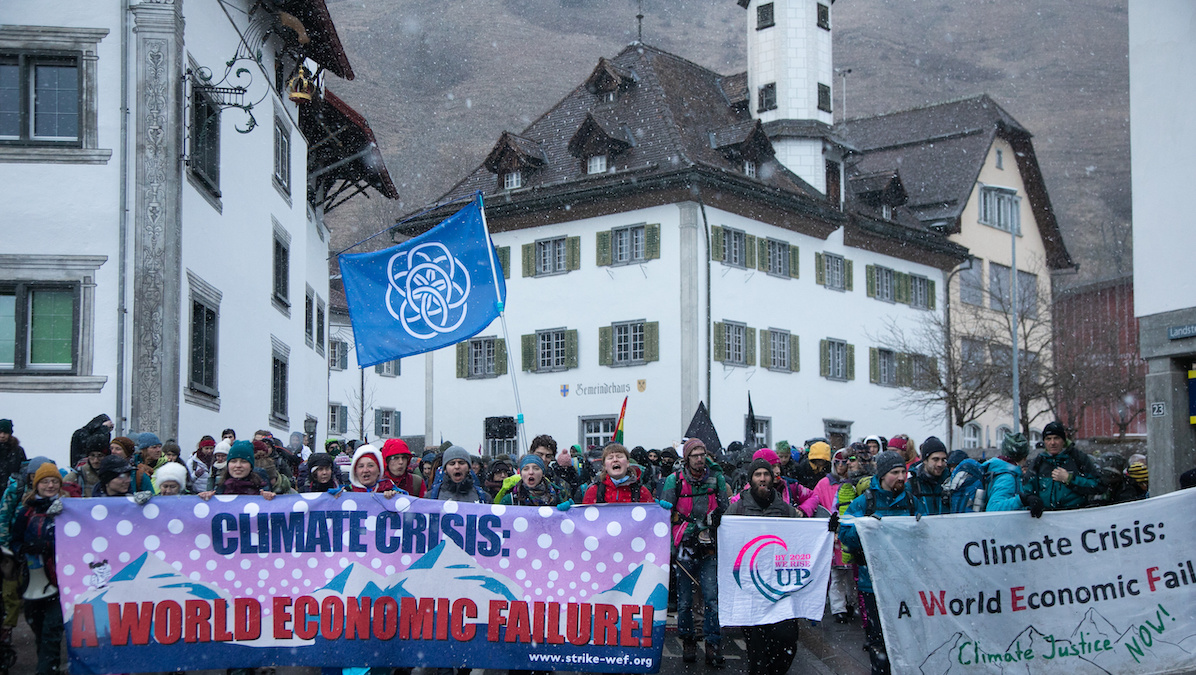
Climate Change Tops World Economic Forum Agenda, Both Greta Thunberg and Trump Expected to Attend

The first day of the Strike WEF march on Davos on Jan. 18, 2020 near Davos, Switzerland. The activists want climate justice and think the WEF is for the world's richest and political elite only. Kristian Buus / In Pictures via Getty Images
By Ashutosh Pandey
Teenage climate activist Greta Thunberg is returning to the Swiss ski resort of Davos for the 2020 World Economic Forum with a strong and clear message: put an end to the fossil fuel “madness.”
Thunberg’s missive is aimed at, among others, U.S. President Donald Trump, who in the past has mocked the Swedish environmental campaigner, saying she has an “anger management problem.” Trump, who is among the most prominent climate change skeptics, is returning to Davos after giving it a miss in 2019 due to a government shutdown.
It’s the first time Trump and Thunberg would be present at the same event since last year’s United Nations climate change summit in New York, where the teenager could be seen staring down the U.S. president as the two briefly crossed paths.
Later, Thunberg — named TIME magazine’s Person of the Year 2019 — told the BBC that she “wouldn’t have wasted [her] time” talking to Trump about the climate crisis at the UN event.
“Honestly, I don’t think I would have said anything because obviously he’s not listening to scientists and experts, so why would he listen to me,” she said.
‘State of Emergency’
Thunberg, who famously told Davos participants last year that “our house is on fire,” has, however, found support among the organizers of the World Economic Forum, including its 81-year-old founder Klaus Schwab, who said the world is facing “a state of emergency.”
“We do not want to reach the tipping point of irreversibility on climate change,” Schwab told reporters on Tuesday. “We do not want the next generations to inherit a world which becomes ever more hostile and ever less habitable — just think of the wildfires in Australia,” he said.
An annual risks survey published by the WEF on Wednesday put climate and other environmental threats ahead of risks posed by geopolitical tensions and cyberattacks. It’s the first time that the survey found the top five long-term risks were all environmental, from extreme weather events to businesses and governments failing to mitigate and adapt to climate change.
Stakeholder Capitalism
Sustainability is the main theme at this year’s Davos meeting, taking place at a time the world is grappling with global warming which is threatening to become worse because of growing divisions among nations and businesses on how to tackle it.
The meeting, which will see over 50 heads of state and government, including German Chancellor Angela Merkel and Italian Prime Minister Giuseppe Conte, descend on the Alpine resort, seeks to give concrete meaning to “stakeholder capitalism” — a concept that businesses should serve the interests of all society rather than simply their shareholders.
“Business has now to fully embrace stakeholder capitalism, which means not only maximizing profits, but use their capabilities and resources in cooperation with governments and civil society to address the key issues of this decade,” Schwab said. “They have to actively contribute to a more cohesive and sustainable world.”
Davos 2020 by the Numbers
- About 3,000 participants from nearly 120 countries. One in four participants is a woman
- 53 heads of state and government
- Nearly 1,700 business leaders, including CEOs from 8 of the 10 most valuable companies in the world
- Over 350 sessions and workshops
- 88% of the cars used by the WEF are electric or hybrid
Reposted with permission from DW.
- Greta Thunberg to Davos Elite: Act Now on Climate to 'Safeguard ...
- Greta Thunberg Urges Norway and Canada to Honor Climate Commitments - EcoWatch
- Climate Crisis: Is It Time to Ditch Economic Growth? - EcoWatch

 233k
233k  41k
41k  Subscribe
Subscribe 